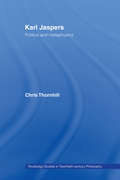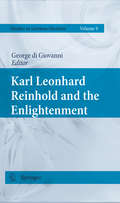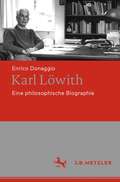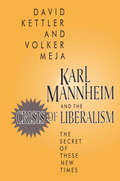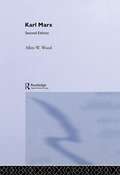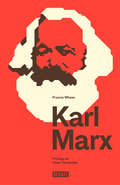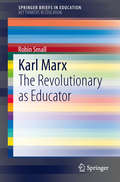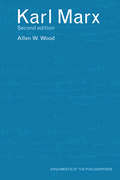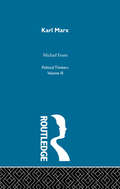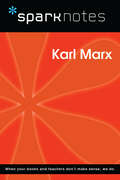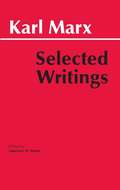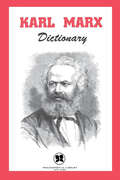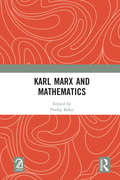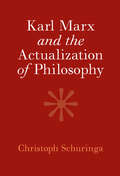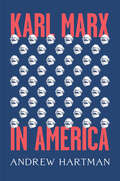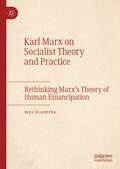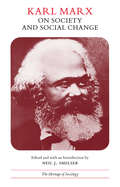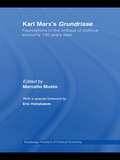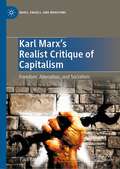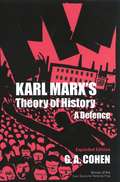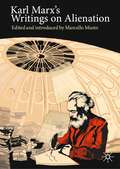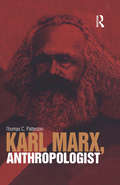- Table View
- List View
Karl Jaspers: Politics and Metaphysics (Routledge Studies in Twentieth-Century Philosophy #Vol. 11)
by Chris Thornhill Dr Chris ThornhillThis book sets out a new reading of the much-neglected philosophy of Karl Jaspers. By questioning the common perception of Jaspers either as a proponent of irrationalist cultural philosophy or as an early, peripheral disciple of Martin Heidegger, it re-establishes him as a central figure in modern European philosophy. Giving particular consideration to his position in epistemological, metaphysical and political debate, the author argues that Jaspers's work deserves renewed consideration in a number of important discussions, particularly in hermeneutics, anthropological reflections on religion, the critique of idealism, and debates on the end of metaphysics.
Karl Leonhard Reinhold and the Enlightenment
by George Di GiovanniKarl Leonhard Reinhold (1757-1823) is a complex figure of the late German Enlightenment. Sometime Catholic priest and active Mason even when still a cleric in Vienna; early disciple of Kant and the first to try to reform the Critique of Reason; influential teacher and prolific author; astute commentator on the immediate post-Kantian scene; and at all times convinced propagandist of the Enlightenment--in all these roles Reinhold reflected his age but also tested the limits of the values that had inspired it. This collection of essays, originally presented at an international workshop held in Montreal in 2007, conveys this multifaceted figure of Reinhold in all its details. In the four themes that run across the contributions--the historicity of reason; the primacy of moral praxis; the personalism of religious belief; and the transformation of classical metaphysics into phenomenology of mind--Reinhold is presented as a catalyst of nineteenth century thought but also as one who remained bound to intellectual prejudices that were typical of the Enlightenment and, for this reason, as still the representative of a past age. The volume contains the text of two hitherto unpublished Masonic speeches by Reinhold, and a description of recently recovered transcripts of student lecture notes dating to Reinhold's early Jena period.
Karl Löwith: Eine philosophische Biographie
by Enrico DonaggioEin dauerndes Unbehagen und eine unbeirrbare Treue zur Philosophie durchziehen Karl Löwiths Leben und Werk. Unter Rückgriff auf zum Teil unveröffentlichte Tagebücher, Dokumente und Briefwechsel mit bedeutenden Vertretern kulturkritischen Denkens (u.a. Heidegger, Jaspers, Strauss, Arendt, Bultmann, Voegelin, Gadamer, Horkheimer, Marcuse und Habermas) rekonstruiert diese 2004 in Italien erschienene Monographie seine Denkbiographie und zugleich die Kritik an der Moderne, die der elegante skeptische Philosoph in seinen Schriften herausarbeitete. Löwiths Ansatz wirkt für ein auf den Menschen gegründetes, mit der Kritik der eigenen Zeit behaftetes Denken ebenso unzeitgemäß wie provokativ: die Theorie vor jeglichem Rückfall ins Politische bewahren, indem ihr ein Sicherheitsabstand von Aktualitätsfragen eingeräumt wird; die Philosophie auf das hin ausrichten, was nicht Geschichte ist – die ewige Ordnung der Natur –, um unsere Beziehung zur Welt in den richtigen Proportionen zu erfassen.
Karl Mannheim and the Crisis of Liberalism: The Secret of These New Times
by David KettlerTo reflect on Karl Mannheim is to address fundamental issues of political enlightenment Mannheim's driving determination "was to learn as a sociologist by close observation the secret (even if it is infernal) of these new times." Mannheim's aim was "to carry liberal values forward." His problem remains irresistible to reflective people at the end of the twentieth century. Mannheim attempted to link social thinking to political emancipation despite overwhelming evidence against the connection. Karl Mannheim and the Crisis of Liberalism is a sympathetic biography of Mannheim's paradoxicalaand paradigmatica'project. The book covers a wide range of European and American thought, including Mannheim's dealings with Georg Lukacs and Oscar Jszi in Budapest; with Alfred Weber, Leopold von Wiese, Franz Neumann, Paul Tillich, Adolph Loewe, and his students in Weimar Germany; with Louis Wirth, Edward Shils, and other major figures in American sociology; and with social analysts and religious thinkers in England. The analysis is informed by dilemmas of history and theory, science and rhetoric, freedom and technical controlathe themes of liberalism. Kettler and Meja carefully depict each stage of Mannheim's life as a sociologist and explore his influence on leading social thinkers. Karl Mannheim and the Crisis of Liberalism combines significant biographical information with insightful sociological theory. It will be a vital resource for historians, sociologists, and political theorists.
Karl Marx
by Allen W. WoodAllen Wood explains the views of Karl Marx from a philosophical standpoint and defends Marx against common misunderstandings and criticisms of his views. This second edition has been revised to include a new chapter on capitalist exploitation and new suggestions for further reading. Wood has also added a substantial new preface which looks at Marx's thought in light of the fall of the Soviet Union and our continued ambivalence towards capitalism, exploring Marx's continuing relevance in the twenty-first century.
Karl Marx
by Francis WheenLa biografía más humana, cercana y amena de uno de los filósofos más influyentes de todos los tiempos Las ideas de Karl Marx son probablemente las que más han influido en el mundo después de las de Jesucristo. En esta apasionante y en ocasiones muy divertida biografía se nos presenta por primera vez a Karl Marx en su faceta más humana. Un apasionado agitador, que pasó casi toda su vida encerrado en la sala de lectura del Museo Británico; un hombre sociable y simpático que, sin embargo, acabó enemistado con casi todos sus amigos; un abnegado padre de familia que dejó embarazada a la criada; un intelectual profundamente serio al que le gustaba beber, contar chistes y fumar puros y un hijo pródigo al que su madre le dijo: «Habría preferido que reunieras un capital en vez de escribir sobre él.» La vida y las ideas de Marx, su encanto y su cólera, se muestran en toda su complejidad y contradicción: la de un brillante y provocador filósofo que vivió, como en los libros de Dickens, los tiempos difíciles de un caballero venido a menos. Otros escritores y periodistas opinan...«Leería cualquier cosa escrita por Wheen, incluso una biografía de Marx.»Nick Hornby «Este libro es una delicia.»Niall Ferguson «Un libro magnífico, divertido y fascinante, un triunfo de Wheen.»A.N.Wilson
Karl Marx
by Gareth Stedman JonesGareth Stedman Jones returns Karl Marx to his nineteenth-century world, before later inventions transformed him into Communism's patriarch and fierce lawgiver. He shows how Marx adapted the philosophies of Kant, Hegel, Feuerbach, and others into ideas that would have--in ways inconceivable to Marx--an overwhelming impact in the twentieth century.
Karl Marx
by Robin SmallThis book is an introduction to Karl Marx (1818-1883) as a radical educational thinker. Marx's own schooling and education are examined and we see how his interest in educational issues was informed by his own experience. Educational themes in Marx's thinking are identified: the role of education within capitalist society, the contribution of education to human development and the character of education in a future society. These are placed in a historical setting by the author and related to public debates over educational policy. Throughout his career, Marx identified education as key to the prospects of the working class. The story of this engagement adds a new dimension to the picture of his work as a philosopher, political economist and socialist revolutionary. The aspects of education that concerned Marx matched prominent features of his theoretical and political activity, and educational themes provided him with a critical application for many of his most important ideas. The author explores Marx's work on the British factory school system, his use of evidence from the reports of school inspectors, and the contemporary movement that led to the establishment of modern systems of public schooling. The final chapter relates Marx's thinking to questions about the place of education in today's society, showing how relevant it is for the twenty-first century. These discussions contain new scholarship, draw on original sources and are written in a clear and readable style. Students in education courses at universities and colleges, educational researchers and teachers will find this examination of Karl Marx's ideas concerning education both engaging and enlightening.
Karl Marx (Arguments of the Philosophers)
by Allen WoodThis is one of the most respected books on Marx's philosophical thought. Wood explains Marx's views from a philosophical standpoint and defends him against common misunderstandings and criticisms. All the major philosophical topics in Marx's work are considered: the central concept of alienation; historical materialism and Marx's account of social classes; the nature and social function of morality; philosophical materialism and Marx's atheism; and Marx's use of the Hegelian dialectical method and the Marxian theory of value.
Karl Marx (Arguments of the Philosophers)
by Wood AllenThis is one of the most respected books on Marx's philosophical thought. Wood explains Marx's views from a philosophical standpoint and defends Marx against common misunderstandings and criticisms of his views. All the major philosophical topics in Marx's work are considered: the central concept of alienation; historical materialism and Marx's account of social classes; the nature and social function of morality; philosophical materialism and Marx's atheism; and Marx's use of the Hegelian dialectical method and the Marxian theory of value.The second edition has been revised to include a new chapter on capitalist exploitation and new suggestions for further reading. Wood has also added a substantial new preface which looks at Marx's thought in light of the fall of the Soviet Union and our continued ambivalence towards capitalism, exploring Marx's continuing relevance in the twenty-first century.
Karl Marx (Political Thinkers Ser. #No. 3)
by Michael EvansFirst published in 1975, this book provides an interpretative introduction to the political thought of Karl Marx. The approach is both historical and analytical, with emphasis placed on developments and changes in Marx's thought. The book is firmly based on a close reading of primary sources including recently discovered documents on the Communist League, the drafts of Marx's Civil War in France and the Grundrisse manuscripts.
Karl Marx (SparkNotes Philosophy Guide)
by SparkNotesKarl Marx (SparkNotes Philosophy Guide) Making the reading experience fun! SparkNotes Philosophy Guides are one-stop guides to the great works of philosophy–masterpieces that stand at the foundations of Western thought. Inside each Philosophy Guide you&’ll find insightful overviews of great philosophical works of the Western world.
Karl Marx - Selected Writings
by Karl Marx Lawrence H. SimonFeaturing the most important and enduring works from Marx's enormous corpus, this collection ranges from the Hegelian idealism of his youth to the mature socialism of his later works. Organized both topically and in rough chronological order, the selections (many of them in the translations of Loyd D. Easton and Kurt H. Guddat) include writings on historical materialism, excerpts from Capital, and political works.
Karl Marx Dictionary
by Morris StockhammerThis accessible and comprehensive reference volume covers the concepts, terminology, and writings of the towering political philosopher. The detailed, authoritative entries of this volume, written in clearly understandable terms, extract the essential ideas from Karl Marx&’s voluminous and historically important works. As the three volumes of Das Kapital are the main source of Marxist thought, every significant passage from this masterwork is isolated for reference and scrutiny. In addition, many other sources from the vast body of Marx&’s writings are closely examined. With its expertly researched, in-depth entries, this volume presents a complete account of Marx&’s philosophy.
Karl Marx and Mathematics
by Pradip BaksiThis collection of various texts on Karl Marx and Mathematics is the revised and extended second edition of the Special Supplement to Karl Marx, Mathematical Manuscripts (1994; Calcutta: Viswakos) titled Marx and Mathematics. The sources of the texts included in the three parts of this collection and, some biographical information about their respective authors have been indicated at the end of each text. The emergence and development of the Ethnomathematics movement continue to change our understanding of the history of evolution of plural mathematics on planet earth since the Neolithic age. Rediscovery and study of some of the neglected source texts have further energized investigations on the subsequent history of mathematical cultures, including those on the histories of algebra and analysis in some of the ancient and medieval languages of Asia, like Sanskrit, Arabic and Malayalam. Consequently, it is now possible to indicate some of the larger gaps in the dominant understanding of history of mathematics not only in Marx’s time, but also at the time of editing Marx’s mathematical manuscripts in the twentieth century, and even today. Finally, the emergence and development of mathematical and statistical software packages are vigorously reshaping our ways of conceptualizing and doing mathematics towards an unknown future. It is time now for taking yet another look at all mathematical text from the past and that includes the mathematical manuscripts of Marx. These texts have been divided into three parts. Part one contains some topical texts related to the history of emergence, development, editing, publication and reception of the mathematical manuscripts of Karl Marx. Part two contains a selection of five articles reflecting some of the investigations inspired by these manuscripts in Russia, India and France. Part three contains five articles on plural mathematics before and after Karl Marx (1818-1883). The texts in this collection are followed by two appendices containing two bibliographies: one on Hegel and mathematics and, the other on mathematics and semiotics. Please note: This title is co-published with Aakar Books, Bew Delhi. Taylor & Francis does not sell or distribute the print edition in South Asia (India, Sri Lanka, Nepal, Bangladesh, Pakistan, Maldives or Bhutan).
Karl Marx and the Actualization of Philosophy
by Christoph SchuringaIt is indisputable that Marx began his intellectual trajectory as a philosopher, but it is often thought that he subsequently turned away from philosophy. In this book, Christoph Schuringa proposes a radically different reading of Marx's intellectual project and demonstrates that from his earliest writings his aim was the 'actualization' of philosophy. Marx, he argues, should be understood not as turning away from philosophy, but as seeking to make philosophy a practical force in the world. By analysing a series of texts from across Marx's output, Schuringa shows that Marx progressively overcame what he called 'self-sufficient philosophy', not in order to leave philosophy behind but to bring it into its own. This involves a major reinterpretation of Marx's relationship to his ancestors Aristotle, Kant and Hegel, and shows that philosophy, as it actualizes itself, far from being merely a body of philosophical doctrine, figures as an instrument of the revolution.
Karl Marx in America
by Andrew HartmanThe vital and untold story of Karl Marx’s stamp on American life. To read Karl Marx is to contemplate a world created by capitalism. People have long viewed the United States as the quintessential anti-Marxist nation, but Marx’s ideas have inspired a wide range of people to formulate a more precise sense of the stakes of the American project. Historians have highlighted the imprint made on the United States by Enlightenment thinkers such as Adam Smith, John Locke, and Thomas Paine, but Marx is rarely considered alongside these figures. Yet his ideas are the most relevant today because of capitalism’s centrality to American life. In Karl Marx in America, historian Andrew Hartman argues that even though Karl Marx never visited America, the country has been infused, shaped, and transformed by him. Since the beginning of the Civil War, Marx has been a specter in the American machine. During the Gilded Age, socialists read Marx as an antidote to the unchecked power of corporations. In the Great Depression, communists turned to Marx in hopes of transcending the destructive capitalist economy. The young activists of the 1960s were inspired by Marx as they gathered to protest an overseas war. Marx’s influence today is evident, too, as Americans have become increasingly attuned to issues of inequality, labor, and power. After decades of being pushed to the far-left corner of intellectual thought, Marx’s ideologies have crossed over into the mainstream and are more alive than ever. Working-class consciousness is on the rise, and, as Marx argued, the future of a capitalist society rests in the hands of the people who work at the point of production. A valuable resource for anyone interested in Marx’s influence on American political discourse, Karl Marx in America is a thought-provoking account of the past, present, and future of his philosophies in American society.
Karl Marx on Socialist Theory and Practice: Rethinking Marx’s Theory of Human Emancipation
by Wei XiaopingThis book discusses Marx’s thinking on human emancipation based on his critique of capitalism and the prospect of socialism. It analyzes the double relations between persons and things, and persons and persons by tracking Marx’s writings, including MEGA2, and taking into consideration the socialist practice and socialist reform of the last century. It is a necessary study for social scientists, social andpolitical philosophers, and students for its deep and wide analysis from the perspective of Marxian theory in practice.
Karl Marx on Society and Social Change (The Heritage of Sociology)
by Karl MarxThis volume presents those writings of Marx that best reveal his contribution to sociology, particularly to the theory of society and social change. The editor, Neil J. Smelser, has divided these selections into three topical sections and has also included works by Friedrich Engels. The first section, "The Structure of Society," contains Marx's writings on the material basis of classes, the basis of the state, and the basis of the family. Among the writings included in this section are Marx's well-known summary from the Preface of A Contribution to a Critique of Political Economy and his equally famous observations on the functional significance of religion in relation to politics. The second section is titled "The Sweep of Historical Change." The first selection here contains Marx's first statement of the main precapitalist forms of production. The second selection focuses on capitalism, its contradictions, and its impending destruction. Two brief final selections treat the nature of communism, particularly its freedom from the kinds of contradictions that have plagued all earlier forms of societies. The last section, "The Mechanisms of Change," reproduces several parts of Marx's analysis of the mechanisms by which contradictions develop in capitalism and generate group conflicts. Included is an analysis of competition and its effects on the various classes, a discussion of economic crises and their effects on workers, and Marx's presentation of the historical specifics of the class struggle. In his comprehensive Introduction to the selections, Professor Smelser provides a biography of Marx, indentifies the various intellectual traditions which formed the background for Marx's writings, and discusses the selections which follow. The editor describes Marx's conception of society as a social system, the differences between functionalism and Marx's theories, and the dynamics of economic and political change as analyzed by Marx.
Karl Marx's Grundrisse: Foundations of the critique of political economy 150 years later (Routledge Frontiers Of Political Economy Ser.)
by Marcello MustoWritten between 1857 and 1858, the Grundrisse is the first draft of Marx‘s critique of political economy and, thus, also the initial preparatory work on Capital. Despite its editorial vicissitudes and late publication, Grundrisse contains numerous reflections on matters that Marx did not develop elsewhere in his oeuvre and is therefore extremely im
Karl Marx's Realist Critique of Capitalism: Freedom, Alienation, and Socialism (Marx, Engels, and Marxisms)
by Paul RaekstadThis book offers the first realist reconstruction of Marx’s critique of capitalism. Reading Marx through a realist lens enables us to make sense of the connections between (1) Marx’s positive concept of freedom, rooted in a theory of human development, (2) his understanding of alienation as diagnosing capitalist unfreedom, and (3) his conceptions of democracy and socialism, respectively, as the cures for this unfreedom. Along the way, it discusses and responds to some of Marx’s most insightful critics, such as Max Weber and Friedrich Hayek. This clarifies Marx’s ideas for a new generation of political thinkers; explains the challenge they pose to contemporary debates about freedom, democracy, and future economic institutions; and demonstrates that these ideas remain both defensible and compelling.
Karl Marx's Theory of History: A Defence
by G. A. CohenFirst published in 1978, this book rapidly established itself as a classic of modern Marxism. Cohen's masterful application of advanced philosophical techniques in an uncompromising defense of historical materialism commanded widespread admiration. In the ensuing twenty years, the book has served as a flagship of a powerful intellectual movement--analytical Marxism. In this expanded edition, Cohen offers his own account of the history, and the further promise, of analytical Marxism. He also expresses reservations about traditional historical materialism, in the light of which he reconstructs the theory, and he studies the implications for historical materialism of the demise of the Soviet Union.
Karl Marx's Writings on Alienation (Marx, Engels, and Marxisms)
by Marcello MustoThe theory of alienation occupies a significant place in the work of Marx and has long been considered one of his main contributions to the critique of bourgeois society. Many authors who have written on this concept over the 20th century have erroneously based their interpretations on Marx’s early writings. In this anthology, by contrast, Marcello Musto has concentrated his selection on the most relevant pages of Marx’s later economic works, in which his thoughts on alienation were far more extensive and detailed than those of the early philosophical manuscripts. Additionally, the writings collated in this volume are unique in their presentation of not only Marx’s critique of capitalism, but also his description of communist society. This comprehensive rediscovery of Marx’s ideas on alienation provides an indispensable critical tool for both understanding the past and the critique of contemporary society.
Karl Marx, Anthropologist
by Thomas C. PattersonAfter being widely rejected in the late 20th century the work of Karl Marx is now being reassessed by many theorists and activists. Karl Marx, Anthropologist explores how this most influential of modern thinkers is still highly relevant for Anthropology today. Marx was profoundly influenced by critical Enlightenment thought. He believed that humans were social individuals that simultaneously satisfied and forged their needs in the contexts of historically particular social relations and created cultures. Marx continually refined the empirical, philosophical, and practical dimensions of his anthropology throughout his lifetime.Assessing key concepts, from the differences between class-based and classless societies to the roles of exploitation, alienation and domination in the making of social individuals, Karl Marx, Anthropologist is an essential guide to Marx's anthropological thought for the 21st century.
Karl Marx: A Life
by Francis WheenIn this first comprehensive biography of Marx since the end of the Cold War, Wheen delivers not a socialist ogre but a fascinating, ultimately humane man, while still examining the criticisms of his detractors. of photos.
